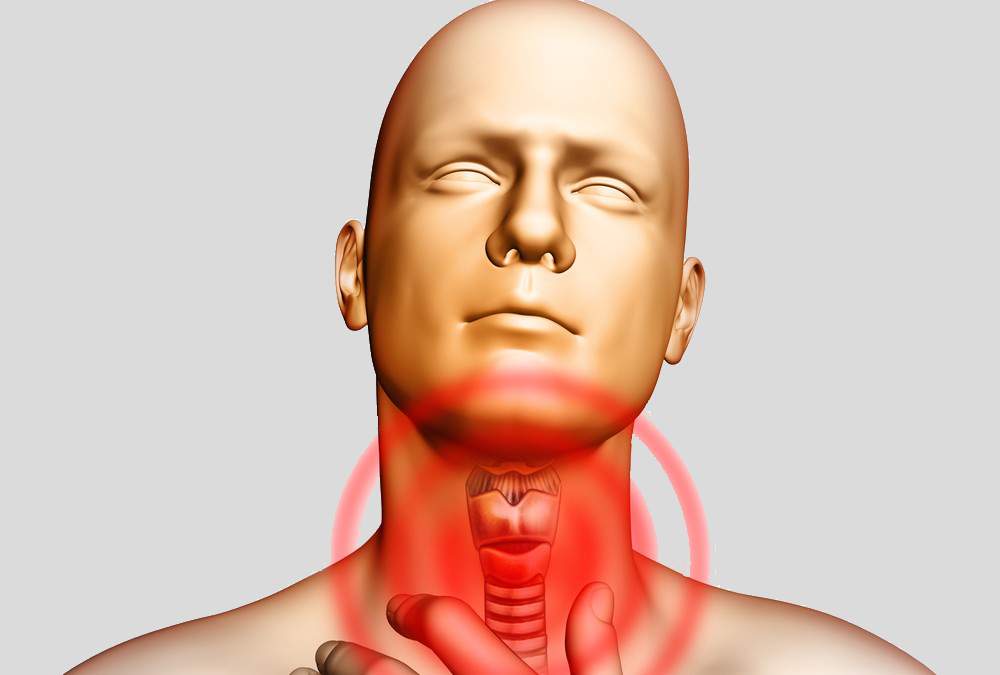
Thyroid Symptoms, Its Causes and Treatment
12-04-2017 | Posted By: Chhavi | 5182 View(s)
Thyroid, also known as the butterfly gland is located below Adam’s apple in your neck. It is one of the most important glands in your body as it controls the metabolic rate of most of your body’s organs. However, many times this gland leads to many health concerns. Here we will give you a Complete Overview of Thyroid Symptoms, Its Causes and Treatment
Understanding the Thyroid Gland
Thyroid releases two hormones, i.e. Triiodothyronine (T3) and Thyroxine (T4) which stimulate your cells to produce new proteins and also increase the amount of oxygen your body uses. Thyroid determines the metabolic rate of your body organs by controlling the release of these hormones.
The thyroid gland in our body is regulated by the thyroid-stimulating hormone (TSH), which is made by the pituitary gland in the brain. It is a common theory that the T3 and T4 hormones are dependent on the amount of iodine we intake. These hormones regulate our entire cell growth and also regulate our metabolism. Thus, Iodine is required so that these hormones can function properly. However, when the thyroid hormone levels in the body are high or low, it leads to thyroid problems.
Types of Thyroid
There are four types of Thyroid Diseases:
1. Hyperthyroidism, which is characterised by overproduction of Thyroid Hormones
2. Hypothyroidism, which occurs due to insufficient production of Thyroid Hormones.
3. Goitre, which is usually harmless and is characterised by swelling of the thyroid gland
4. Thyroid Cancer, it is quite rare and occurs mostly in people who have received radiation treatment to the head and neck in their life.
Hyperthyroidism and Hypothyroidism are the most common kinds of thyroid problems.

Causes of Thyroid Disorders
Thyroid diseases may occur due to inappropriate TSH levels in the body, or else sometimes disorders are caused by problems in the thyroid gland itself.
One of the most common types of Thyroid problems is Hyperthyroidism. The many factors and causes that lead to Hyperthyroidism are:
-Graves’s disease
This is one of the most common causes of Thyroid problem which occurs mainly in adults. It is an autoimmune disease which tends to release more of thyroid hormones into the body which leads to Hyperthyroidism.
-Toxic adenomas
This condition occurs when a single nodule (or lump) grows on the thyroid gland and begin to secrete thyroid hormones, which upset the body’s chemical balance and leads to overproduction of thyroid hormones, thus causing Hyperthyroidism.
-Subacute Thyroiditis:
Sometimes, there is an inflammation of the thyroid gland which causes the gland to secrete excess hormones. This results in hyperthyroidism which usually lasts a few weeks but may persist for months. This is yet again one of the most common causes of Thyroid Problem.
Another common type of Thyroid Disease is Hypothyroidism. Various causes and factors that lead to this condition are:
1.Hashimoto’s Thyroiditis
This is an autoimmune disease which attacks the thyroid tissues, and thus the tissues eventually die and stop producing thyroid hormones which lead to Hypothyroidism. The exact cause of this condition is not yet known.
2.Removal of the Thyroid Gland
If the Thyroid Gland has been surgically removed or chemically destroyed from the body, it leads to Hypothyroidism.
3.Iodine Deficiency in the Body
Those who intake less amount of Iodine are at increased risk of developing Hypothyroidism. Researchers have shown that areas which do not have rich sources of Iodine can have more number of people suffering from Hypothyroidism.
4.Malfunctions of the Other Glands
Not just the thyroid glands, but even if other important glands that regulate the thyroid goes inactive or stop functioning such as the pituitary gland; it can lead to Hypothyroidism.
5.Medications
There are certain medications which can also lead to this condition.
Thyroid Symptoms
1. Symptoms of Hyperthyroidism are:
-Increased Heart Rate
-High Blood Pressure
-Feeling warm
-Increased sweating
-Feeling nervous without any cause
-Feeling restless
-Stopped menstrual cycles
-Loss of sleep is a common Thyroid Symptoms of this kind of Thyroid Disease.
-Increase in the intake of diet
-Unexpected Weight Loss
-Frequent Bowel Movements
-Osteoporosis
-Puffiness around the eyes, sensitivity to light and increased tears
-Mood swings
-Fever

2. Symptoms of Hypothyroidism are:
-Dry hair and skin
-Feeling confused all the time
-Constipation
-Depression
-Loss of hair
-Increased menstrual flow
-Not able to stand a cold temperature
-Feeling irritated
-Slower heart rate
-Weakness and fatigue
-Weight Gain
-Muscle cramps
-A decrease in cognitive abilities
-Low Body Temperature
These are some of the common Thyroid Symptoms. If you experience any of these symptoms on a regular basis, you must consult a Physician and go for a thyroid test.
Diagnosis of the Thyroid Disorders
There are different types of thyroid problems. The Doctors generally take into account the medical history of the patients and if they can correlate the Thyroid Symptoms with the disease then they ask them to go for a complete Thyroid Profile test which measures the level of T3 and T4 hormones in the body. This test helps the Doctor know what kind of Thyroid Problem the patients are suffering from.
In some cases, the Doctors also ask patients to for an Ultrasound test as the ultrasound images of thyroid can show the underlying structural causes of thyroid diseases and can also detect the presence of any a tumour or a cyst.
Once the cause of the disease is known, the treatment must be started right away because if not treated at the right time; Thyroid diseases can lead to several other health complications like Heart Diseases and psychological problems. Thyroid tests are painless, and usually, require a blood sample or imaging test. Be assured as once a proper diagnosis is made; these diseases can be managed and controlled effectively.
Tips to Prevent Thyroid Problems
-Eat fruits and vegetables- Thyroid can be maintained by eating fresh fruits and vegetables. However, if you suffer from Thyroid problem; consult your Doctor about which fruits and vegetables to take as some vegetables and fruits can be harmful than helpful.
-Avoid alcohol, caffeine and tobacco products, as they impact your thyroid in a negative manner.
-Exercise daily- Aerobic exercise is one of the best exercises for thyroid problems.
-Drink Plenty of Water
-Watch the intake of sodium you take; you must take the right amount of sodium as both high and low amount of sodium in the body can lead to Thyroid problems.
-Go for a regular check-up- This is a tip which must be followed for preventing all kind of health conditions as a medical examination can help you prevent many diseases.
It can be concluded that although Thyroid is a serious health concern; Should you suffer from any of the Thyroid Symptoms, do not take it casually-Thyroid can be treated effectively with the help of medications and some lifestyle changes. Consult a doctor immediately. Go for a regular Health Check Up, after all- Health is Wealth!


